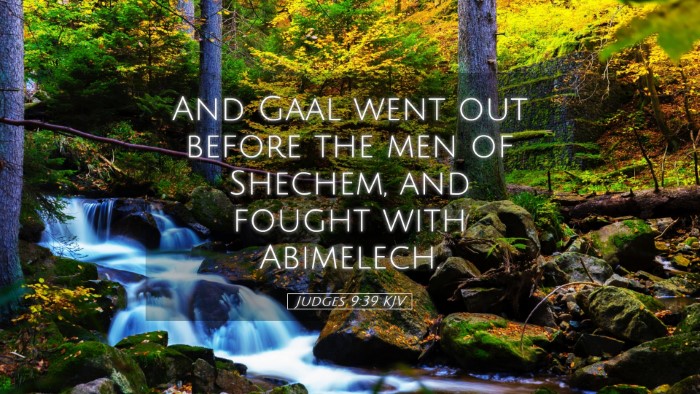Commentary on Judges 9:39
Scripture Context: Judges 9:39 is set within the narrative of Abimelech’s rise to power and the ensuing chaos that leads to conflict and tragedy in Israel. This verse captures a decisive moment in a larger story filled with intrigue, betrayal, and the struggle for authority.
The verse reads: "And Gaal went out before the men of Shechem and fought with Abimelech."
General Overview
This passage opens a critical scene where Gaal, an outsider, challenges Abimelech’s rule. Understanding this context is vital as it reflects the themes of leadership, loyalty, and the peril of strife in Israel.
Insights from Matthew Henry
Matthew Henry emphasizes the tumultuous nature of leadership during this period in Israel’s history. He notes that Gaal's challenge signifies the people's desire for a different kind of governance, possibly disillusioned with Abimelech's tyranny.
- Leadership Challenges: Henry points out that the Israelites' tendency to follow charismatic leaders often leads them into moral ambiguity, exemplified by Abimelech’s violent ascent to power.
- Divine Sovereignty: He highlights the overarching sovereignty of God, who allows such factions to arise for a larger purpose in Israel’s narrative of repentance and restoration.
Insights from Albert Barnes
Albert Barnes provides historical context, remarking on the significance of Gaal as a figure representing rebellion and discontent among the Shechemites. He observes that this uprising against Abimelech was not only a personal conflict but also indicative of the instability inherent in leadership devoid of divine approval.
- Consequences of Rebellion: Barnes elucidates the implications of such rebellion, pointing out that while Gaal's actions may inspire hope for change, they can also lead to dire consequences, reflecting the cyclical nature of sin and judgment in Judges.
- Human Fallibility: He underscores the lesson of human fallibility in the throes of power struggles, reminding readers that leadership, when devoid of God’s guidance, oftentimes leads to destruction.
Insights from Adam Clarke
Adam Clarke offers a textual analysis of the word choices and dynamics involved in Gaal’s confrontation with Abimelech. He analyzes the motivations behind Gaal’s boldness, suggesting that it arose from both ambition and a sense of justice among the oppressed.
- Symbolism of the Conflict: Clarke views the struggle as symbolic of the greater conflict between righteous leadership and tyrannical control, echoing themes found throughout the Book of Judges.
- Warnings Against Ambition: He warns against the ambition that leads one to forsake ethical considerations; Gaal’s motivations, while seemingly noble, are fraught with danger and potential for further bloodshed.
Theological Reflections
From these commentaries, several theological reflections emerge that hold relevance for today’s readers, particularly pastors and theologians:
- The Nature of Leadership: Leadership in both church and interpersonal contexts must be grounded in humility and a reverent fear of God. The narratives of Judges caution against the seductive nature of power and ambition.
- Divine Providence: God’s providence orchestrates even the conflicts within human governance, reminding believers that no authority is ultimate aside from God’s sovereign rule.
- Moral Integrity: The actions of Gaal and Abimelech present a critical lens through which to examine our own motivations and the ethical frameworks through which we navigate leadership roles.
Practical Applications
As we reflect on Judges 9:39, the implications extend far beyond the historical context to modern-day applications:
- Evaluation of Leaders: Believers are called to discern leadership by evaluating character, integrity, and alignment with God’s will rather than mere charisma or capability.
- Community Engagement: Engage with communal leadership and governance issues with an awareness of the spiritual and moral implications that arise in times of conflict.
- Commitment to Righteousness: Uphold a commitment to righteousness in all forms of conflict, recognizing that true justice must reflect God’s nature and be informed by His Word.
Conclusion
Judges 9:39 serves as a potent reminder of the complexities of leadership and moral choice in a fractured society. The combined insights of Henry, Barnes, and Clarke underscore the need for conscientious and God-centered leadership as embodied by Christ, who provides the ultimate model of servant leadership.


